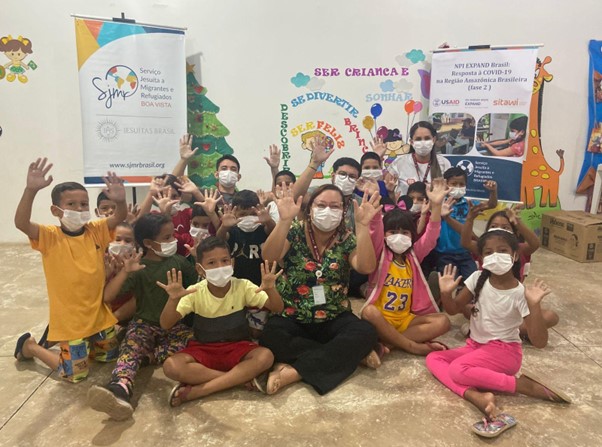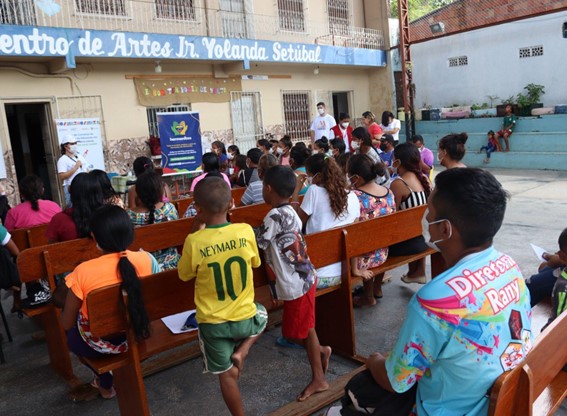Success Story
Migrants in the Amazon: addressing challenges to healthcare access worsened by the pandemic
February 23, 2024
Through the USAID-funded New Partnerships Initiative (NPI) EXPAND Brazil project, implementation partners worked to increase vaccination against COVID-19 in the Amazon region. In Brazil, NPI EXPAND supports projects dedicated to facing the COVID-19 pandemic and promoting the immunization of vulnerable and isolated communities. These projects show how collaboration among the public, private, and social sectors can encourage capacity strengthening, promote innovation, and improve essential public services, such as the Unified Health System (Sistema Único de Saúde (SUS)) in Brazil.
The COVID-19 pandemic challenged society in new ways and exposed the glaring deficiencies in the healthcare system, particularly for the most vulnerable groups. Among these groups are migrants. In the Brazilian Amazon region, especially in the northern part of the country, there has been a significant influx of migrants seeking refuge and a better quality of life. Venezuela, in particular, has been the main country of origin due to its severe economic, political, and humanitarian crises. In 2022 alone, more than 33,000 Venezuelans sought recognition as refugees. In this context, the efforts of projects supported by NPI EXPAND Brazil and funded by USAID recognize this critical issue and prioritize addressing it in programming.
Common barriers hinder access to healthcare for migrant populations in the region. These include receiving misinformation and fake news about COVID-19 vaccination, language barriers, and a need for clearer information on accessing healthcare services. Furthermore, fear and insecurity also emerge as obstacles that affect the pursuit of medical care.
In the face of these challenges, partners implementing projects through NPI EXPAND pursued common approaches and objectives:
- Promoting the dissemination of accurate and educational information, especially related to health, vaccination, and the Brazilian health system
- Strengthening the local healthcare system through the training of health workers, community engagement, and the reinforcement of healthcare facilities
- Emphasize social participation through community leaders who share the same language and similar habits, as they are uniquely positioned to effectively convey and promote best practices for domestic healthcare and hygiene
Working alongside migrant groups

SJMR’s project working with children and adolescents addressed sensitive topics such as the consequences of the pandemic and migration conditions. Photo: SJMR
With different strategies and locations in the Amazon region, four projects sought to raise awareness about COVID-19 prevention and strengthen healthcare services.
The Associação Hermanitos aims to welcome and integrate Venezuelan migrants in Manaus (Amazonas). Tulio Condé Duarte Silva, the director of Hermanitos, noted that many migrants were being marginalized in the job market due to their vaccination status, stemming from issues such as false information, language barriers, and a lack of clear access to healthcare services. Through an educational approach, the “Vacina para Todos” project sensitized both the population and shelter managers through roundtable discussions and workshops on household COVID-19 precautions, reaching 60,281 people.
Similarly, the institution Serviço Jesuíta a Migrantes e Refugiados (SJMR) conducted 120 awareness activities directly impacting 2,795 beneficiaries and indirectly reaching around 40,000 people in Manaus and Boa Vista (Roraima). The initiative included informative and psychosocial sessions, “health journeys”, which are campaigns that brought healthcare services to remote neighborhoods, and recreational activities with children. Flávia Reis, project coordinator at SJMR in Boa Vista, emphasizes the value of these activities for children and adolescents. “Amid challenges and adverse circumstances, especially those related to forced migration, the activities provided emotional, social, and cognitive learning moments.”
Using a participatory approach, the project “Amazônia: Ciência, Saúde e Solidariedade no Enfrentamento da Pandemia da COVID-19“, implemented by Fiotec in partnership with Fiocruz Amazônia (ILMD/Fiocruz Amazônia), conducted education, engagement, and communication workshops in municipalities in the Amazonas and Acre regions. The meetings aimed to identify and address barriers to vaccination and healthcare access, and according to Júlio Cesar Schweickardt, the project coordinator, they were significant moments of collective sharing, listening, and knowledge creation.
“Seeing people understanding, engaging, and being concerned about communicating and informing others about vaccination is a great joy”, he says, celebrating the success of the applied methodology and the informative materials produced by the communities. These outcomes will be condensed and released as a guide for facilitators, educators, and municipal secretaries.
Another important strategy employed by the projects was to provide special attention to health workers and strengthen healthcare services. Hermanitos conducted training for over 160 professionals through workshops and awareness-raising actions in healthcare units in Manaus, contributing to improving care in Basic Health Units (UBSs – public primary healthcare facilities in Brazil). These initiatives focused on increasing knowledge about COVID-19 and its specific implications for the Venezuelan migrant population. The workshops provided updated information on the vaccination schemes that Venezuelans bring from Venezuela and discussed strategies to enhance vaccination. Additionally, they addressed cultural and linguistic issues, recognizing the importance of cultural and linguistic sensitivity.
Yessica Torres, a collaborator at Hermanitos, is a Venezuelan migrant who arrived in Brazil in February 2022. She shares how she noticed improved healthcare services within UBSs during her prenatal care after the sensitization efforts. “The project not only promoted COVID-19 vaccination but also provided Venezuelan migrants, both indigenous and non-indigenous, with a safe environment in which they could express themselves, receive relevant information about the Brazilian healthcare system, and learn about support networks they could access.”
SJMR also conducted training and capacity-building sessions for healthcare professionals impacted by the challenges of the pandemic and contributed to the strengthening of two UBSs in Boa Vista.
The Venezuelan indigenous community in Brazil
Among the Venezuelan migrants and refugees coming to Brazil, there has also been an increasing influx of indigenous people. It is estimated that there are already 7,000 indigenous Venezuelans in Brazilian territory, with 70% belonging to the Warao ethnic group.

Activities of the Hermanitos Association aim to reinforce understanding of COVID-19 and healthcare. Photo: Hermanitos
The project “Redes de Comunicação Indígena: Tecendo Laços contra a COVID-19”, led by the Instituto Internacional de Educação do Brasil (IEB), focused on empowering the Warao people in the cities of Belém and Ananindeua, in the state of Pará, in collaboration with the Warao Ojiduna Council, and in partnership with the Indigenous Council of Roraima (CIR). The IEB has been working with this group since 2021 and played a role in establishing the Warao Ojiduna Council in Pará, gaining insights into the challenges faced by this community. This initiative aimed to transform members of the Warao community into communicators, equipping them to share crucial healthcare information internally and facilitating external communication with Brazilian healthcare professionals and managers.
Lanna Beatriz, a socio-environmental analyst at IEB, reflects on the project’s journey: “We began by addressing communication and COVID, and we concluded a project that gained a scope we didn’t even expect, achieving broader outcomes in improving Warao people’s access to specific policies.” Jhonny Rivas, one of the leaders of the Warao community in Pará and coordinator of the Warao Council, shares his perspective: “We realized that IEB was the only one who stood by our side, helping us understand our rights as refugees, immigrants, and, most crucially, as indigenous people. Now, our battle is to ensure our representation because no one else can speak for us.”
Beyond the Projects
As Lanna points out: “Warao people living in urban contexts don’t have access to specialized healthcare that respects their cultural specificities, their understanding of healing, illness, and their language.” These same challenges extend beyond the Warao and affect the entire migrant and refugee population.
The projects not only led to a higher demand for COVID vaccines among the Venezuelan population, equipped with essential and trustworthy information to make informed decisions, but also forged enduring networks and emotional connections that extend beyond the projects themselves.
To facilitate ongoing access to healthcare for migrant populations, organizations should emphasize the importance of informing and welcoming migrant populations, providing continuous support, and helping them understand the resources available not only to access healthcare in times of crisis but also to maintain good health.